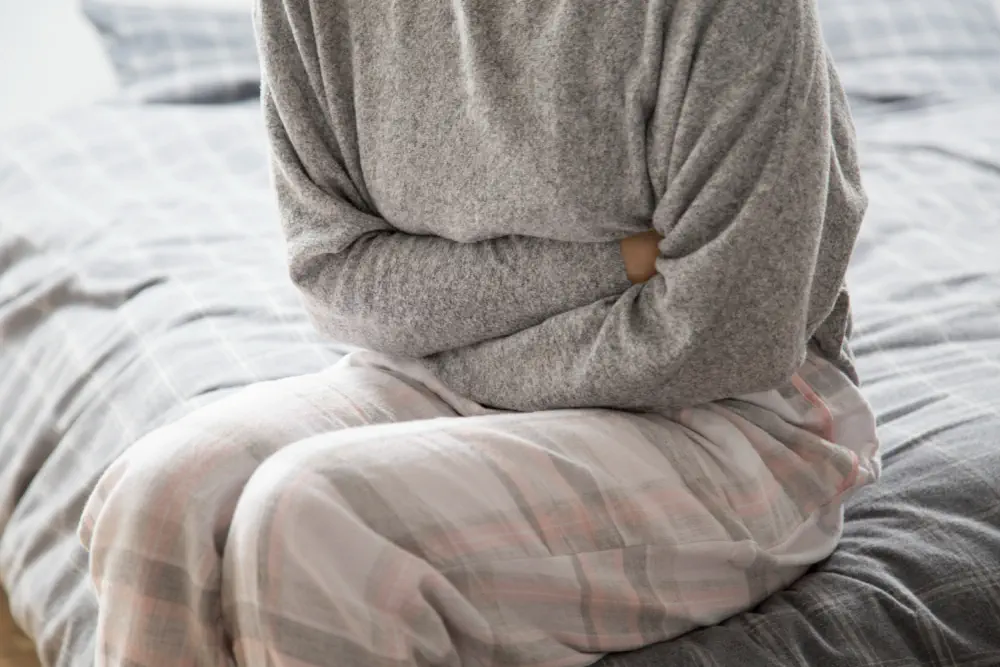We offer medical detox and multiple addiction treatment options in our
luxury treatment centres in Port Hope, Cobourg, and Ottawa.
How Laxative Addiction Affects Your Body?
Laxative addiction silently destroys lives through a seemingly harmless habit. What begins as occasional use for constipation or weight control transforms into physical dependency. Your body becomes trapped in cycles requiring increasingly higher doses. Beyond digestive damage, this condition affects cardiovascular health, mental well-being, and social relationships. Recovery demands professional support addressing both physical healing and psychological triggers underlying this destructive pattern.

Key Takeaways
- Physical Dependency Development: Laxative addiction creates severe dehydration and dangerous electrolyte imbalances that can lead to heart problems and kidney damage
- Digestive System Damage: Long-term use weakens your colon's natural muscle function, requiring increasingly higher doses to achieve the same results
- Hidden Systemic Effects: Beyond gut damage, chronic use affects bone health, cardiovascular function, and neurological processes throughout your body
- Overdose Risks: Acute laxative overdose can cause life-threatening cardiac complications and requires immediate emergency medical intervention
- Recovery Timeline: Professional medical supervision prevents dangerous withdrawal complications, with full bowel function restoration taking 6-12 months
- Comprehensive Treatment: Successful recovery combines medical monitoring, psychological therapy, and family support to address underlying triggers
What Drives People to Develop Laxative Addiction?
The path to laxative addiction rarely begins with intention. Most people start using these medications for legitimate constipation relief or misguided weight loss attempts. The immediate results create false confidence — temporary weight reduction from fluid loss feels like progress toward fitness goals.
Eating disorders frequently fuel laxative misuse. Individuals with bulimia nervosa or anorexia often view laxatives as purging tools, believing they prevent calorie absorption. This misconception drives repeated use despite minimal actual weight loss benefits. The temporary bloating relief reinforces the behavior, creating psychological dependence alongside physical tolerance.
Social media and diet culture amplify these problems. "Detox" marketing promises quick fixes through bowel "cleansing." Young adults, particularly women, become vulnerable to these messages during periods of body dissatisfaction or life stress. The secrecy surrounding laxative use prevents early intervention when treatment would be most effective.
Perfectionist personalities face higher risks. Those struggling with control issues find laxatives provide immediate, measurable results. The ritual becomes comforting during emotional turmoil. Athletes in weight-class sports or appearance-focused activities may begin using laxatives for competition preparation, then struggle to stop afterward.
Trauma survivors sometimes develop laxative addiction as a coping mechanism. The physical discomfort temporarily distracts from emotional pain. Self-harm aspects of severe cramping and dehydration can fulfill psychological needs for punishment or control over bodily sensations.
How Does Laxative Addiction Damage Your Digestive System?

Your intestinal tract suffers progressive damage from chronic laxative exposure. Stimulant laxatives force unnatural muscle contractions, eventually weakening the colon's ability to function independently. Nerve endings controlling bowel movements become desensitized, requiring increasingly powerful stimulation to produce results.
The dependency cycle accelerates rapidly. Initial doses that once provided relief become ineffective within weeks. Users double, then triple their intake seeking the same results. Some individuals consume entire boxes daily, far exceeding recommended dosages. This tolerance development mirrors other substance addictions.
Progressive Intestinal Damage Stages
- Early Stage (1-3 months): Occasional cramping, irregular bowel movements between doses
- Moderate Stage (3-12 months): Complete inability to have bowel movements without laxatives, chronic abdominal pain
- Severe Stage (1+ years): Colon muscle atrophy, permanent nerve damage, risk of bowel perforation
Natural elimination processes shut down entirely. The colon becomes lazy, relying on external stimulation for basic function. Beneficial gut bacteria populations crash from constant flushing, disrupting immune system support and nutrient absorption. Chronic inflammation develops throughout the digestive tract.
Melanosis coli frequently appears in long-term users — dark pigmentation staining the colon lining. While typically reversible, this condition indicates significant tissue damage. Severe cases may develop a cathartic colon, where the organ becomes permanently dilated and loses normal muscle tone.
What Are the Hidden Dangers Beyond Your Gut?
Laxative addiction creates systemic health crises extending throughout your entire body. Chronic dehydration strains kidney function as these organs struggle to maintain fluid balance. Electrolyte imbalances disrupt cellular processes in every tissue and organ system.
Potassium depletion proves particularly dangerous. This mineral regulates heart rhythm, muscle contractions, and nerve signaling. Severe deficiency can trigger cardiac arrhythmias, muscle weakness, and paralysis. Emergency room visits for heart palpitations often reveal underlying laxative abuse.
Magnesium and sodium losses compound the problem. Magnesium deficiency causes muscle cramps, seizures, and personality changes. Sodium imbalances affect blood pressure regulation and brain function. The combination creates a perfect storm for cardiovascular emergencies.
Bone health deteriorates rapidly. Malabsorption prevents calcium and vitamin D uptake necessary for bone density maintenance. Young women face particular risks for osteoporosis development decades earlier than normal. Stress fractures become common even with minimal physical activity.
Kidney damage accumulates silently. Chronic dehydration forces these organs to work overtime concentrating urine. Kidney stones form more frequently due to concentrated mineral solutions. Long-term users may develop chronic kidney disease requiring lifelong management.
Can You Overdose on Laxatives?

Yes, absolutely. Overdosing on laxatives represents a genuine medical emergency that many people underestimate. Acute overdose occurs when someone consumes massive quantities, seeking faster results or during emotional crises. The consequences can prove fatal without immediate medical intervention.
| Overdose Symptoms | Timeline | Severity Level |
| Severe dehydration, dizziness | 2-6 hours | Moderate |
| Electrolyte imbalance, heart palpitations | 6-12 hours | Serious |
| Kidney failure, cardiac arrest | 12-24 hours | Life-threatening |
Emergency symptoms requiring immediate hospital care include severe abdominal pain, bloody stools, fainting, chest pain, or confusion. These signs indicate dangerous fluid and electrolyte shifts threatening vital organ function. Activated charcoal may help if administered quickly, but intravenous fluid replacement becomes critical.
Chronic overdose patterns develop gradually. Users lose awareness of normal dosing as tolerance builds. Taking multiple laxative types simultaneously amplifies dangers. Combining stimulant laxatives with osmotic types creates unpredictable interactions, potentially causing bowel perforation.
Emergency Response Protocol
Healthcare providers must act swiftly when treating a laxative overdose:
- Blood tests reveal electrolyte levels guiding treatment decisions.
- Cardiac monitoring becomes necessary due to potassium depletion risks.
- Psychiatric evaluation often follows once medical stability returns, as overdose may indicate suicidal ideation.
How Does Laxative Addiction Affect Your Mental Health?
The psychological toll of laxative addiction extends far beyond physical symptoms. Shame and secrecy dominate daily life as users hide their behavior from family and friends. The constant preoccupation with bowel movements disrupts normal social activities and relationships.
Depression commonly develops alongside physical dependency. The cycle of temporary relief followed by worsening symptoms creates hopelessness. Energy depletion from chronic dehydration contributes to persistent fatigue and mood instability. Many users describe feeling emotionally numb or disconnected from their bodies.
Anxiety peaks around bathroom availability and timing. Users plan entire days around laxative schedules, avoiding social events that might interfere with their routine. The fear of constipation without laxatives becomes overwhelming, driving continued use despite obvious health consequences.
Obsessive-compulsive behaviors emerge around laxative rituals. Some users count pills repeatedly, organize them by color or type, or follow elaborate timing schedules. These behaviors provide temporary control feelings but ultimately reinforce the addiction cycle.
Social isolation accelerates as the addiction progresses. Friends and family notice personality changes, cancelled plans, and mysterious health complaints. Relationships suffer from the user's inability to be present or honest about their struggles. The loneliness deepens depression and strengthens addiction patterns.
Body image distortion frequently accompanies laxative addiction. Users become obsessed with temporary weight fluctuations caused by fluid retention or loss. The scale becomes their primary measure of self-worth, driving increasingly dangerous behaviors to achieve desired numbers.
How to Reverse Laxative Dependency Safely?

Reversing laxative dependency requires careful medical supervision to prevent dangerous complications. Abrupt cessation can trigger severe constipation lasting weeks, tempting users to resume laxative use. Professional guidance ensures a gradual reduction while supporting natural bowel function recovery.
Step-by-Step Recovery Process
- Seek Medical Evaluation: Complete physical examination, including blood tests to assess electrolyte levels, kidney function, and overall health status, before beginning withdrawal.
- Begin Gradual Tapering: Reduce laxative doses by 25-50% weekly under medical supervision. Replace stimulant laxatives with gentler osmotic alternatives during transition periods.
- Implement Bowel Retraining: Establish regular toilet timing (same time daily) to reestablish natural reflexes. Spend 10-15 minutes on the toilet even without urges to retrain your body.
- Modify Diet Gradually: Increase fiber intake slowly (5 grams weekly) to prevent gas and bloating. Add fruits, vegetables, and whole grains while
Following this structured approach significantly improves recovery success rates while minimizing dangerous complications. Each step builds upon the previous one, creating sustainable healing patterns that restore both physical function and emotional well-being. Remember that recovery is a process, not a destination, and professional support remains available throughout your healing journey.
What is Laxative Addiction Treatment?
Laxative addiction treatment addresses both physical dependency and psychological triggers through comprehensive care approaches. Treatment combines medical monitoring with therapeutic interventions to ensure safe recovery while preventing relapse.
1. Initial Medical Assessment
Complete evaluation includes physical examination, blood work testing, electrolyte levels, and psychological screening. Healthcare teams identify co-occurring eating disorders, depression, or anxiety requiring simultaneous treatment. Nutritional status evaluation guides dietary rehabilitation planning throughout recovery.
2. Inpatient Medical Stabilization
Severely dependent users or those with dangerous medical complications require inpatient care. Round-the-clock monitoring ensures safety during acute withdrawal phases. Medical staff intervene quickly if cardiac problems or severe electrolyte imbalances develop during detoxification.
3. Individual Therapy Sessions
Therapy explores the root causes behind laxative use through evidence-based approaches. Cognitive-behavioral therapy helps identify triggers and develop healthier coping strategies. Patients learn to recognize emotional states leading to laxative urges and practice alternative responses.
4. Group Therapy Support
Peer support reduces isolation and shame while building motivation for recovery. Group sessions focus on body image, self-esteem, and healthy relationship development. Sharing experiences with others facing similar struggles provides validation and practical coping strategies.
5. Family Therapy Integration
Treatment addresses relationship dynamics that may enable or trigger addictive behaviors. Loved ones learn appropriate support techniques while establishing healthy boundaries. Education about addiction helps family members understand recovery process timelines and ongoing challenges.
6. Nutritional Rehabilitation
Registered dietitians create meal plans supporting digestive recovery while addressing underlying eating disorder patterns. Regular monitoring prevents obsessive behaviors while ensuring adequate nutrition. Nutritional counseling becomes vital for overall physical and psychological healing.
Can Recovery from Laxative Addiction Lead to Complete Healing?

Recovery from laxative addiction offers genuine hope for physical and emotional restoration. While this requires dedication and professional support, thousands of individuals have successfully reclaimed their health and rebuilt meaningful lives. Your body possesses remarkable healing abilities when given proper care and time. Professional treatment addresses root causes while supporting natural recovery processes, creating sustainable change beyond mere symptom management.
Ready to break free from laxative dependency? Contact the Canadian Centre for Addictions at 1-855-499-9446 today to begin your personalized recovery.
FAQ
How long does it take for your bowel to recover from laxative addiction?
Bowel function recovery varies significantly between individuals but typically requires 6-12 months for substantial improvement. Initial relief may occur within weeks of stopping laxatives, but complete restoration of natural reflexes and muscle tone takes much longer. Some individuals experience permanent changes requiring ongoing dietary and lifestyle modifications.
What are the most dangerous physical complications of laxative abuse?
The most serious complications include severe electrolyte imbalances leading to cardiac arrhythmias, kidney failure from chronic dehydration, and bowel perforation in extreme cases. Potassium depletion poses immediate life-threatening risks to heart function, while long-term kidney damage may require lifelong medical management.
Are certain types of laxatives more addictive than others?
Stimulant laxatives carry the highest addiction potential due to their rapid action and the dramatic tolerance development they create. Osmotic and bulk-forming laxatives generally pose lower addiction risks but can still create psychological dependency, especially when used for weight control purposes.
Can laxative addiction cause permanent damage to your intestines?
Severe, long-term laxative abuse can cause permanent damage, including nerve damage (enteric neuropathy), muscle atrophy, and structural changes to the colon. However, many users experience significant recovery with proper treatment, though some may require ongoing dietary modifications and medical monitoring.
Is it safe to use laxatives occasionally after recovering from addiction?
Most addiction specialists recommend complete avoidance of laxatives except under strict medical supervision for legitimate constipation issues. Even occasional use can trigger psychological urges and potentially restart the addiction cycle. Alternative constipation management strategies are generally preferred for individuals with addiction histories.






